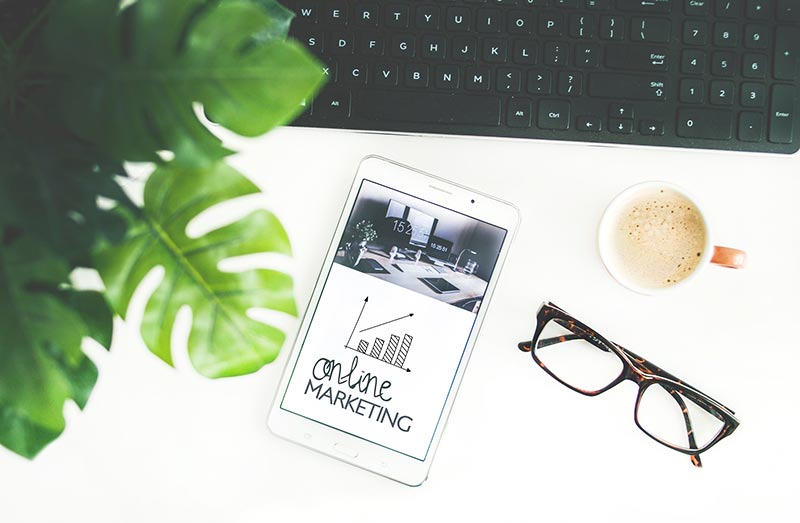What is Green Marketing? If you're looking for a clear answer to this question, you've come to the right place! The future belongs to companies that work sustainably. They combine profitability with the lowest possible environmental impact and fair trade, thus attracting attention and achieving long-term success. Not least because sustainability is playing an increasingly important role for consumers.
However, sustainability-oriented advertising and public relations require honest, transparent action and a clear strategy.
In this article, I would like to give you everything you need to know about the so-called ecomarketing. From the definition, types, characteristics, the marketing mix, advantages and disadvantages, to strategies and examples. Finally, I will also give you valuable tips for practical implementation. Let's go!
Here is a short overview for you in advance:
- Definition
- Types
- Features
- Marketing mix
- Advantages and disadvantages
- Strategies and examples
- Tips
- Closing words
Definition: What is Green Marketing?

Green marketing or eco-marketing refers to the sales-promoting activities of a company, with the deliberate aim of helping to plan, coordinate, enforce and control all market-oriented transactions. to bring about a prevention and reduction of environmental pollution.₁
Compared to conventional marketing activities, green marketing takes into account ecological and ethical decision-making criteria in addition to customer and competitive orientation. Conscious and honest environmental thinking subsequently increases a company's sales opportunities.
The following terms are also commonly used for this form of marketing Green marketing, Environmental Protection Marketing, sustainable marketing or ecology-oriented marketing.
Types: What forms does sustainable marketing take?
Since definitions tend to come across as a bit dusty in their essence, I've listed for you once again the essential types and characteristics that you can use to do green marketing, or by which you can recognize green marketing.
- Passive: As the name suggests, one's own marketing activities basically automatically become more sustainable because (new) laws and regulations are complied with or implemented.
- Selective: Companies let their own activities be guided by the behavior of the competition and dare at most to make a few attempts on their own initiative.
- Internal: Companies that are environmentally and socially responsible with the processes within the organization, but less so with the products offered to the outside world, can be assigned here.
- Innovative: Environmental protection and sustainability are a priority here. Both internally and externally. A comprehensive strategy to solve specific grievances or environmental problems is developed and credibly implemented.
Characteristics: How can you recognize sustainable marketing?

Here are some characteristics and modes of action by which you can recognize companies with serious, sustainable marketing strategies:
- Sense of responsibility
- Resource conservation
- Longevity
- Environment
- Fairness
- Economic efficiency
- Relevance
- Storytelling
- Honesty
- Transparency
- Conviction
- …
Both ecological and economic, as well as social aspects, must be taken into account in ecomarketing. The most important thing is, to be absolutely honest and transparent with people and potential customers.
Businesses with a sustainable marketing strategy highlight, for example, the fair manufacturing process, the organic and recycled material, the energy-saving work processes or the ecological benefits of their products. It is reported honestly, extensively and in detail.
Difference from greenwashing: The negatively charged concept of the Greenwashings means consumer-deceptive marketing measures that present a company or individual products as particularly environmentally friendly and sustainable, even though they are not. Greenwashing is therefore superficial and neither honest, nor relevant, nor economical - because in the long run it harms a company more than it helps. Those who try to lie to and deceive their own target audience will lose in the end.
Coordination: What does a sustainable marketing mix look like?

Since I studied online marketing, I have naturally absorbed and internalized the classic marketing mix. But how about simply combining the four points with the aspects of sustainability. Then the 4 P's of green marketing would look something like this:
- Product policy (Product): Products and services offered contribute to the protection of our environment and ideally even combat existing environmental problems, such as the Deforestation of the rainforests.
- Pricing policy (Price): The price range is usually somewhat higher in green marketing. Customers are prepared to bear the additional costs arising from environmental aspects in moderation, as long as the company's work is transparent and the measures are plausible.
- Distribution policy (Place): A company's distribution and transport routes are important for green marketing, especially from the point of view of sustainable mobility. Companies that organize themselves in an environmentally friendly and resource-saving way enjoy great advantages here.
- Communication (Promotion): All advertising measures should be communicated in as environmentally friendly a manner as possible. For example, companies that engage in green marketing mostly communicate the content of their offer digitally in order to Save paper.
Advantages and disadvantages: What speaks for and what against green marketing?

In the following, I would now like to take a look at the advantages and disadvantages of sustainability marketing. You will quickly see that the opportunities clearly outweigh the risks.
Advantages and opportunities at a glance
What reasons do entrepreneurs and employees have for doing only green marketing in the future? And what exactly encourages customers to prefer the offerings of sustainable companies? Here are a few opportunities and advantages associated with this form of environmentally conscious public relations:
For companies themselves
- Stronger trust. For example, from customers who notice that sustainability is a top priority in the products offered.
- Deeper identification of employees. For example, because employees know that they are doing good with their work.
- Growth. For example, through greater awareness as a result of eliminating environmental issues.
- Image improvement. For example, durable, reusable products and serious environmental and climate protection in the company.
- Cost savings. For example, through shorter transport routes and less packaging material.
- Additional unique selling point. For example, because the ecological added value of a product represents another USP (Unique Selling Proposition).
Basically, sustainable action has no real disadvantages for anyone. From a company's point of view, however, one could mention the possibly more difficult search for suppliers, as well as the risk of slipping into greenwashing due to the often higher production costs and the associated new pricing policy.
For our society
- Less greenwashing. As a consumer:in, you find trust in certain brands that prefer honest, green marketing. This in turn minimizes the chances of success for companies that engage in greenwashing.
- Health. Working in fair and sustainable companies lets you work in a Act job that makes you happy.
- Fairness. Many companies that consciously practice sustainable marketing also work sustainably internally - and ensure fair working conditions and appropriate pay, for example.
- Good conscience. As an employee:in fair and environmentally conscious companies, you know that you are doing something good and creating added value for yourself, but also for nature and our society.
- Job Opportunities. The chances of keeping your job in the long term are often greater at sustainable, forward-looking companies. Feel free to get in touch with us at the Job portal for sustainable job postings inspire.
- Clarification. Green marketing generates attention for the Environmental problems of our time and contributes to their solution. In addition, the Environmental Awareness in society.
For consumers, too, sustainable marketing by companies has no real disadvantages. I could mention here the often higher product prices. As a counter-argument, however, it should be mentioned that sustainable products are usually much more durable. Furthermore, it should not remain unmentioned that you can by a seriously meant sustainable behavior basically also save a lot of money can.
Disadvantages and risks at a glance
Green marketing therefore has a whole range of advantages. Even though I had already touched on the few disadvantages, I would like to clearly summarize the dangers and risks here and add a few things:
- High adjustment costs. Switching to organic products (e.g., from organic farming or organic forestry) can be somewhat more expensive. As a rule, obtaining organic certification is not free of charge either. Companies must then accept the increased costs or pass them on to their customers. In the long term, however, the investment is usually worthwhile for the company itself, for consumers and for the environment.
- Potential problems with suppliers:inside. It may be that longstanding business relationships have to be abandoned because your company wants to engage in green marketing and, for example, only offer organic products. It may be difficult to find the right suppliers. But sustainable action never works without change and should not fail due to a lack of suppliers.
- Danger of greenwashing. If sustainability marketing is only half-heartedly planned and implemented, it can quickly be interpreted as greenwashing. The result can be, for example, shitstorms and permanent damage to the corporate image. However, this risk can be minimized through a transparent strategy and the integration of green marketing into the overarching corporate philosophy.
5 Strategies and examples for the practical implementation of green marketing

Now I've told you a bit about the definition, types, characteristics, marketing mix, and benefits of this seminal form of modern marketing. But what does it all look like in practice? Here you will now learn many practical examples, as well as tips for the implementation in your company.
1. philosophy & storytelling
A company's philosophy, as well as sustainable storytelling, are examples of long-winded, but the more effective marketing strategies in the long term. Companies that assume social responsibility and operate transparently will enjoy major competitive advantages over time.
Example 1: A StartUp makes regular sustainable company outings and thereby supports e.g. associations in cleaning up beaches. The photos are shared on social media.
Example 2: A company that sells drinking bottles prints them with inspiring messages for environmental protection and uses part of the proceeds to promote Founders:inside in the implementation of further, sustainable business ideas.
2. green promotional products
The image of promotional items has suffered somewhat in our society. This is because they are often equated with cheap disposable items. But in the meantime there are also many suppliers who deliberately avoid resource-saving, fair and sustainable production and use of their promotional products.
Example: A company that sells promotional items as cheap mass-produced goods makes a conscious decision to offer only durable items made from recycled or organic raw materials that are produced under fair conditions.
3. campaigns without direct product reference
The campaigns of a company, do not always have to focus on the product offered. Instead, a Initiative that promotes, for example, conscious, sustainable action by our society, initially create new trust, generate great interest and ultimately also increase sales figures.
In this way, green marketing can also function entirely without a product-related message - and thus combine success and environmental protection.
Example: A trade fair organizer for sustainable business advertises in the subway with large posters that one should avoid capsule coffee because it creates 8,000 tons of waste every year and the coffee thereby costs almost unnoticed 70€ per kilogram.
4. donations to social projects (cause-related marketing)
This form of green marketing is somewhat controversial. This is because it is often not the product, but only the promised additional service sustainable. But fundamentally, this type of ecomarketing really makes sense from many points of view.
After all, you are selling a product, motivates potential customers through donations to animal welfare organizations or other social enterprises and also educates society about existing grievances and institutions worth supporting. The company's own image is promoted - and this again increases the chances of long-term success.
Example: A company that offers organic nut bars, organic hand soaps and mineral water donates - absolutely transparently - one meal for every bar purchased, one bar of soap for every hand soap purchased and one day of drinking water for every mineral water purchased to those in need. In this way, for example, the company counteracts problems such as the World Hunger or the Water Shortage against.
5. transparency and responsibility
In terms of green marketing, a company acts in an absolutely transparent and responsible manner in order to Increase credibility and customer loyalty. Therefore, for example, detailed information about supply chains and the origin of raw materials should be published.
This transparency creates Trust on the part of customers - in both the company and the products. A company with a clear conscience has nothing to hide and thus appears customer-oriented and trustworthy.
Example: A food company publishes a detailed sustainability report every year. It explains the sustainability goals and all the concrete measures along the value chain to achieve them. From energy consumption and waste management, to internal diversity and equal opportunities, to the development of greener products and climate protection in the supply chain.
Can you think of other implementation examples for green marketing? Then feel free to write me a comment with your suggestions.
6 Tips and Ideas: What's essential to consider for effective green marketing?

All promotional claims about your product and services must be verifiable and authentic - and, among other things, include a genuine Added value for you, the environment and society Generate.
If you want to work with your company score points with your potential customers by acting sustainably I've put together some more tips and ideas for you here.
1. cooperate with experienced organizations
Work with Environmental organizations or NGOs to demonstrate your commitment to sustainability and benefit from the expertise and network of experts.
2. conserve resources in operation
You should definitely sustainable marketing media prefer. Send your customers emails instead of letters, avoid printed catalogs, and make files available for download instead. If you have to print something, use recycled paper.
Also reduce packaging waste through a clever design and the use of environmentally friendly materials. These measures make it even easier for your company and your consumers, Conserve resources.
3. promote climate protection in the company
Analyze the CO2 footprint of your company and identify areas where climate-damaging emissions can be reduced. Develop appropriate measures - for example, to increase energy efficiency, to use renewable energies or for the reduction of Business Travel. Also the communicated CO2 Offset can be an effective advertising tool on the road to CO2 neutrality.
Tip: Even more ideas for more Climate protection in the company you get in the linked blog article.
4. exemplify social responsibility
Consider social aspects such as fair working conditions and local communities in your sustainability concept to ensure a holistic approach to green marketing. For example, actively promote it, Stop child labor and ensure fair supply chains.
Also develop the Corporate citizenship of your company. For example, invest in the social environment of the company and take on regulatory responsibility in the region. In addition, your company should have a Declaration of Principles on the Observance of Human Rights publish
5. earn certifications and seals
Try to obtain recognized environmental certifications and seals with your products to show their increase ecological value and credibly communicate their benefits.
Here are some examples for inspiration:
- Blue Angel (Eco-label for paper products)
- GOTS (sustainable textiles)
- FSC (Wood products from sustainable forestry)
- Fair Trade (Fair trade products)
6. refrain from moral exaggeration
Avoid placing your actions or your company morally above others or lecturing consumers. Just take a clear, open position, communicate them and answer questions in line with your sustainability strategy.
Sustainable marketing - The great opportunity for companies and our environment
Unfortunately, in order to save costs, many entrepreneurs tend to drift into greenwashing in their public relations work. Of course, this must be avoided. Honesty and a focus on sustainability, on the other hand, are rewarded by environmentally conscious customers.
"Openness is a key that can open many doors."
Ernst Ferstl (more at Honesty Quotes)
Openness, honesty, trust and credibility are therefore trumps! Corporate managers must take care to remain authentic and genuine. The green marketing strategy must become an integral part of the corporate philosophy for it to work on a lasting basis. Then the chances are great to stand out from the competition and attract many Convince people.
Do you have any questions, tips or suggestions about green marketing? Then I look forward to your comment.
Stay sustainable and environmentally conscious,

PS: If you can also imagine yourself starting a business that adds value to our society and the environment, be sure to check out the post about sustainable foundation on. Good luck!
References:
₁ M. Kirchberg: Gabler Wirtschaftslexikon - Ökomarketing, available at https://wirtschaftslexikon.gabler.de/definition/oekomarketing-42734 [25.04.2023].









